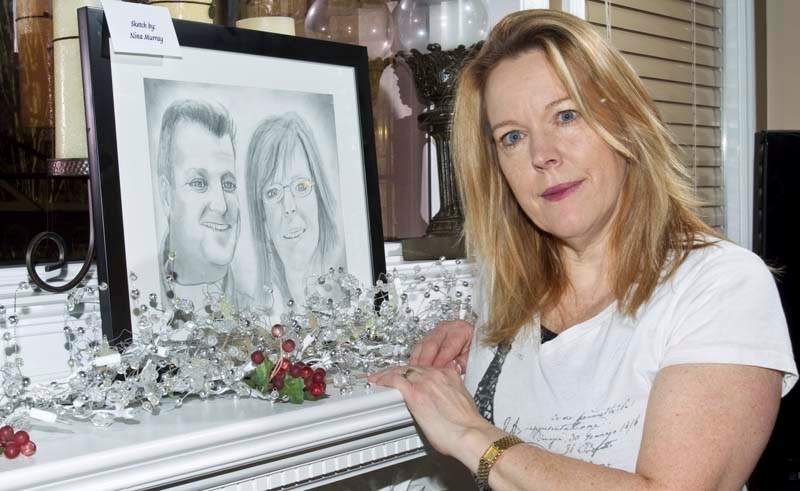When Darrell Pacholok's chemotherapy drugs stopped working, his wife Shirley knew she wanted to care for him at home until the end.
"I always knew in my heart that I was going to keep him as long as I could," she said. "Because when you leave to go to a hospice you don't come home."
Darrell Pacholok was diagnosed with a brain tumor in 2005. After several years of treatments and periods of remission, Darrell was put on palliative care in March 2013. He died on Oct. 19 at the age of 50.
He spent his last two-and-a-half weeks at the Sturgeon Community Hospital, a hospital with no designated palliative care beds.
"In St. Albert there are no hospices and the support that you have in your community is crucial to the family and to the patient. When you remove them from the community, you go through it alone," said Shirley.
In the city of St. Albert, there is a single palliative care bed at Youville Home. Residents seeking out palliative care must commute to the Grey Nuns Community Hospital in Edmonton.
Shirley explained that by caring for Darrell at home it allowed their friends, family and members of their church to visit often. The reason she was able to have him at home for so long was because of the help of palliative care and home care services through Alberta Health Services (AHS).
"You can keep someone at home if you want, but if you don't have anyone prepared to come to the house and deliver that service, it's very scary," noted Shirley.
House calls
The Pacholoks' started receiving four hours of help from a homecare aide per day after a seizure caused Darrell to lose his ability to talk, see and swallow. They were also assigned a palliative care team consisting of a doctor, nurse, respiratory and physical therapists that did regular home visits.
Dr. Barbara Fischer was Darrell's palliative doctor. She is one of several doctors at the St. Albert and Sturgeon Primary Care Network that does house calls for palliative patients in addition to her work as a general practitioner.
Her role is to check up on patients, ensuring their pain is managed, wounds are treated and other ailments associated with terminal illness such as nausea, shortness of breath and anxiety, are taken care of.
Depending on what stage her patients are in, they may come to the clinic for visits in order to maintain a sense of normalcy in their daily lives, or she makes house calls if they can't make the trip.
Fischer is an advocate for more palliative care beds and hospice units in St. Albert. She said when families make the decision to care for their loved one at home or put them in hospice, they have to consider the distance and whether they can make the 45-minute drive to services in Edmonton.
"I think it's very disruptive to families and unfair to them. I mean it's the last weeks to days of this person's life and we're going to split these families apart, literally," she said.
"I think it's important we support these patients wherever they need the care, whether it's at the home or whether it's in a more institutionalized setting. They need to have that support in place so they can feel comfortable, so they can change their mind when the time comes."
Fischer explained that many of her patients say they want to be at home as long as possible but, like Darrell, things change.
Darrell was admitted to the Sturgeon after his respiratory function took a turn for the worse and his health care needs couldn't be managed at home.
"That's not how you want someone to pass – in distress," added Shirley. "That's not the goal of palliative care. It's supposed to be a managed, peaceful passing."
Although Darrell was able to spend his last weeks at the Sturgeon, that option isn't available to everyone, noted Fischer.
"If you're dying too slowly in hospital here, they say no you can't stay here any longer, you have to go in hospice if you're not going home," she remarked.
Since 2010 in St. Albert, the AHS palliative community consult team has treated an average of 52 palliative patients at home and 147 patients at the Sturgeon. An average of five are treated at the Youville Home every year.
The St. Albert Homecare office served 224 palliative clients from 2012 to 2013.
Staying in St. Albert
Shirley Pacholok said her family chose to live in St. Albert because of the culture. "St. Albert is not Edmonton," she remarked.
"With St. Albert having the reputation it does – walkways and botanical beauties – that's why people live here. On the other hand there (is a lack of) hospice beds. There is care on one side, but no plans in place for the other."
Shirley noted that palliative care in Edmonton is not only a question of convenience, but the patient's caregivers (doctors and nurses) change as well as their support network.
"When you're forced to leave your community to get that kind of care, how then is the community helping you?" she questioned.
"The way (people) help you through it is by being there for you (because) there is nothing else they can do. But when you take that option away … none of that is available."
The lack of palliative care in St. Albert has recently been brought to the forefront of discussion. A number of churches and community volunteers formed a steering committee in October to look at ways to improve palliative care in the community.
People can access palliative care by doctor referral or self-referral by calling Community Care Access at 780-496-1300.




